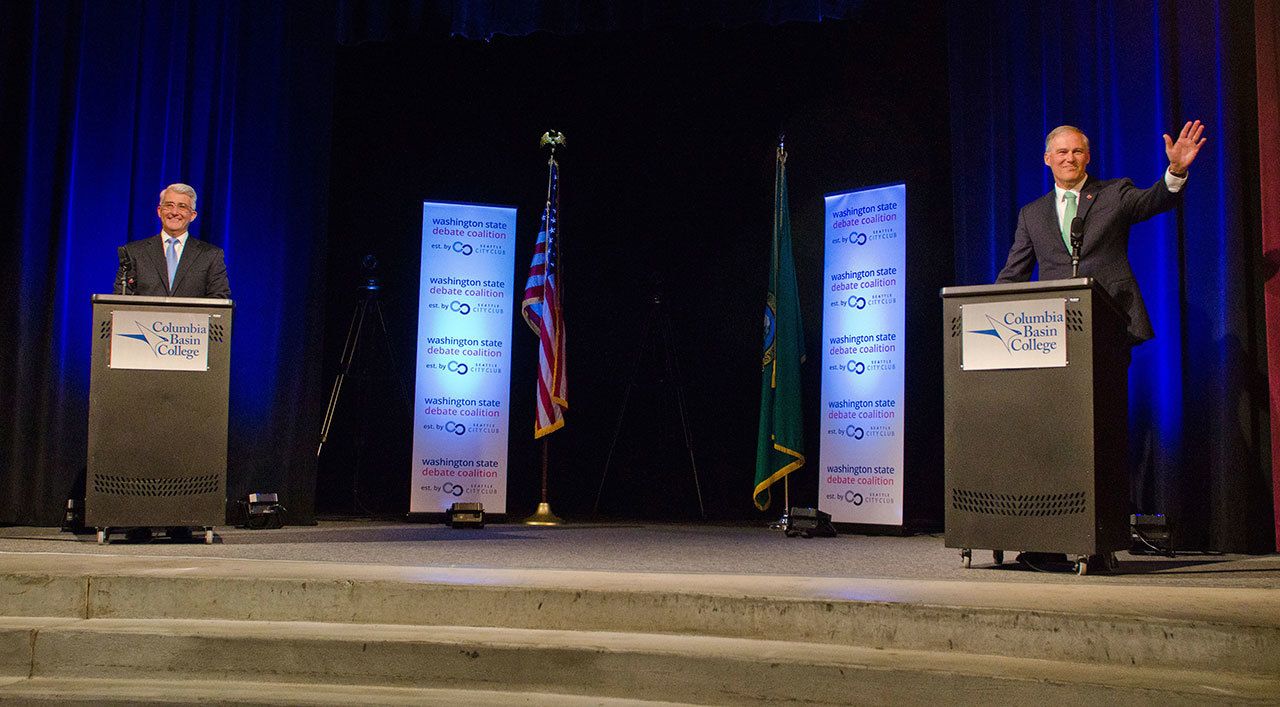By Nicholas K. Geranios
The Associated Press
PASCO — Democratic Gov. Jay Inslee and Republican challenger Bill Bryant clashed over the death penalty, Hanford lawsuits and their visions of the state in their third debate Wednesday night.
The debate, sponsored by the Washington State Debate Coalition, occurred at Columbia Basin College in Pasco.
Inslee is a former congressman seeking his second term as governor. He said Washington has the nation’s best economy and was making progress on a host of problems.
“We are a confident and optimistic state,” Inslee said. “I believe we ought to keep the ball rolling.”
Bryant, a former Seattle port commissioner, painted a picture of a state in dire straits because of a disengaged governor. He said he would be “an engaged, activist governor.”
“Is there anyone who thinks we can’t do better,” Bryant said.
The candidates were asked if they would support using the death penalty against the shooter in the recent mass killings in Burlington.
Inslee said he would continue his moratorium against the use of the death penalty, which he said is unfairly applied. Bryant said he would follow state laws that allow the use of the death penalty.
“The governor can’t ignore the law,” he said.
The state has recently filed several lawsuits against the Hanford Nuclear Reservation, located near the Tri-Cities, over delays in cleanup and the exposure of workers to vapors that made them sick.
Bryant contended the state’s lawsuits were not speeding the cleanup of the former plutonium production site.
“We need leadership, not lawsuits,” Bryant said, adding that the lawsuits made it difficult for the two parties to negotiate and settle problems.
But Inslee said sometimes litigation is necessary, especially when it comes to ensuring that workers are safe.
“It would be better if the feds fulfilled their obligations,” said Inslee, who used to represent central Washington in Congress.
The two clashed over the complicated issue of funding for public schools.
Bryant contended Inslee did not have a plan to provide the money the state Supreme Court is demanding for schools.
“He has no plan. He is not engaged,” Bryant said, sounding his main theme of the night.
But Inslee noted that under his leadership, billions of extra dollars have been provided for schools.
“We’ve had action,” he said.
The state Supreme Court ruled in 2012 that the way Washington pays for education is unconstitutional, in part because of an overreliance on local dollars to pay expenses that should be covered by the state budget.
The court gave the Legislature until 2018 to fix the problem and then found the state in contempt in 2014, fining it $100,000 per day to be set aside into an education account.
Since the 2012 ruling, lawmakers have spent more than $2 billion to address issues raised in the lawsuit.
Bryant rapped the incumbent Democrat over failures in the state’s mental health system and for failing to deal with traffic congestion and the homeless.
“We need to reduce traffic congestion,” Bryant said.
Inslee pointed to a $16 billion transportation package that was funding projects across the state.
“It’s the most massive infrastructure building program in the history of the state,” Inslee said.
Bryant also said the state was failing to save natural runs of its iconic salmon populations in the Columbia Basin.
“Salmon runs are going extinct,” he said.
